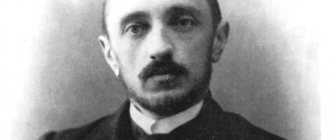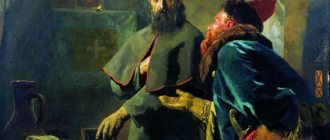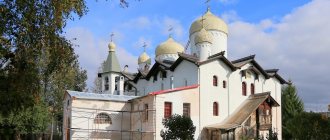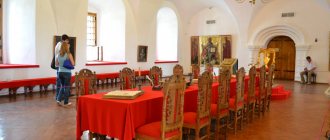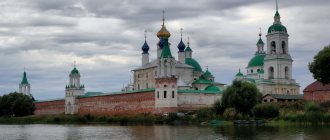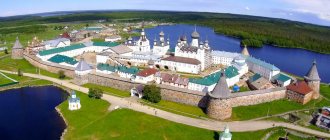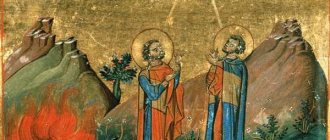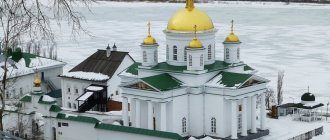Filka's letter, or How Ivan the Terrible dealt with Metropolitan Philip?
In the 30th year of his life, Fyodor was tonsured with the name Philip in the Solovetsky Monastery. Nine years later, the brethren elected Philip as abbot. He turned out to be an excellent organizer and managed to transform the harsh Solovetsky region. The monastery became one of the richest and most famous in Russia, where thousands of pilgrims flocked.
Philip had a stern character, inflexibility, and an independent view of current events. He was supported by numerous relatives who were both in the oprichnina and in the zemshchina. Philip publicly demanded that Ivan the Terrible “leave the oprichnina” and unite two parts of the country - the oprichnina and the zemshchina. During long negotiations, the tsar tried to prove that the oprichnina was his personal and family matter, and the metropolitan should not interfere in the tsar’s affairs. However, the metropolitan can exercise the right to consult with the tsar and is allowed to intercede for the disgraced. Such a right was abolished from the founding of the oprichnina. Philip accepted the terms and was installed as metropolitan on July 25, 1566. After Philip's election as metropolitan, the terror weakened a little, but a few months later it broke out with renewed vigor.
The head of the church took under the protection of the boyar I. P. Fedorov, accused of organizing a conspiracy to overthrow Ivan IV. To intimidate Philip, the tsar summoned his cousin F.I. to Alexandrovskaya Sloboda. Umny-Kolychev, who traveled to Lithuania on a diplomatic mission and failed to fulfill it. After listening to the report, the sovereign pretended to be satisfied with the boyar’s arguments, presented him with gifts and sent him to Moscow. On the way, he was attacked by guardsmen sent ahead, who took away not only his gifts, but also his clothes. Many Kolychevs, relatives of the Metropolitan, were subjected to repression.
On Sunday, March 22, 1568, Ivan the Terrible and his guardsmen, dressed in black vestments and tall monastic caps, with sabers drawn, arrived in Moscow. The Emperor went to the Assumption Cathedral for a service. At the end of the service, the king approached Philip for a blessing. The Metropolitan did not deign to pay attention to him. Twice more the king addressed the saint. Philip was silent.
On July 28, the Tsar and a drunken crowd of guardsmen arrived at the Novodevichy Convent, where a temple holiday was celebrated with a procession of the cross. The service was conducted by the Metropolitan. Even at the Stoglavy Cathedral, it was condemned to wear a small tafya cap on the head during services as a custom alien to Orthodoxy. Philip saw the taffy on one of the guardsmen and gave him a severe reprimand. The king took this as a challenge and immediately left with his entourage. After this incident, Ivan the Terrible left for Alexandrovskaya Sloboda. Philip left the metropolitan court, going to live in a monastery.
Prince Temkin’s commission went to Solovki to collect materials about the “vicious life” of Philip. The evidence she put forward turned out to be implausible, and the commission member, Bishop Paphnutius, refused to sign the investigative report. On September 11, 1568, the day of the reprisal against I.P. Fedorov, his supporter, the Metropolitan’s second cousin Mikhail Kolychev, was killed along with his three sons. The king ordered Michael's head to be sewn into a leather bag and sent to Philip to a monastery, hoping to intimidate the saint.
Metropolitan Philip, without initially resorting to open speeches against the oprichnina, sent letters of exhortation to Ivan the Terrible, in which he called on the tsar to reconcile himself and come to his senses. The Emperor is tired of these messages. He began to call Philip Filka, as the people called simpletons, idiots or simpletons. The tsar mockingly called letters from the metropolitan “Filka’s letters” - empty, meaningless pieces of paper.
This is how the expression “filkina gramata” appeared in the Russian language, meaning an illiterate message, an unsubscribe, stupid clerical writing that has no legal force.
While in Alexandrovskaya Sloboda, the tsar in August 1568 gave the order to conduct a trial of the head of the church. Novgorod Archbishop Pimen was summoned to Moscow to lead the council trial of Philip. The Tsar was afraid to accuse the Metropolitan of treason and intended to depose him for his “vicious life.” Before the trial, there was a wave of executions of supporters of I.P. Fedorov and the Metropolitan.
At the Church Council, the Novgorod Archbishop Pimen, who was obedient to the Tsar in everything, was a particularly ardent accuser of the Metropolitan. They forced the Solovetsky abbot Paisius, who was promised the rank of bishop, to make a false statement. The obedient hierarchs slandered the saint, just to please the sovereign. Before the clergy and boyars, Philip not only denied all the charges brought against him, but again demanded that Ivan stop the oprichnina. Metropolitan renounced his rank. Ivan the Terrible did not accept the resignation and ordered Philip to again accept the metropolitan symbols.
On November 4, the court decided to depose the metropolitan, but the tsar demanded that four days later Philip hold a service on the day of the great feast of Michael.
When the Assumption Cathedral was filled with parishioners and Philip began the service, the guardsmen, led by Alexei Basmanov and Malyuta Skuratov, burst in and interrupted the service. After reading the royal decree and the conciliar verdict on the deposition of Philip, Malyuta attacked the deposed metropolitan and tore off his holy robes. The guardsmen took him out of the cathedral, hammered his legs into wooden stocks, put iron shackles on his hands and took him to the monastery in a simple sleigh, vilifying and beating him along the way.
Philip was placed in a stable and starved to death. A few days later the king was informed that Philip had freed himself from stocks, shackles and chains. Then, as the legend tells, Ivan the Terrible ordered a fierce bear to be allowed into the prisoner’s dungeon for the night, but the beast did not touch him... Philip was sent to the Otroch Monastery in Tver.
In December 1569, the oprichnina army moved to defeat Novgorod. Along the way, the punitive forces stopped in Tver. Ivan the Terrible sent Malyuta Skuratov to Philip to receive a blessing, but he did not want to sanctify the crime. On December 23, 1569, Malyuta strangled the 62-year-old inflexible old man with a pillow, and told the monks that the saint had died of intoxication. The monks buried Philip behind the altar.
Tags: Ivan the Terrible, Tsar, Russia, history, Solovki, monastery
Paradoxes of the obvious
We, as a rule, do not know history well, so with historical figures everything is initially clear to us: this one is a tyrant, this one is a hero... But Tsar Ivan is a bright, contradictory personality, constantly providing food for discussion. And next to him, Saint Philip, in his iconic hagiography, unambiguous as a monument: the adamant of faith, courageously exposed the tyrant king, who was mired in sin, and accepted the crown of martyrdom for it. And in fact?
Holiness does not always look iconographic. So the way of the cross of the future Metropolitan Philip (Kolychev) began... with fear and flight, when in 1537 the Kolychev family sided with Staritsky Prince Andrei, who rebelled in Novgorod against Elena Glinskaya, the mother of the young Tsar Ivan, and fell into disgrace. And Fyodor - then not yet Philip - Kolychev, a courtier, Duma nobleman under Vasily III, was afraid. His uncle Ivan Umnoy-Kolychev, who remained loyal to Staritsky, went to prison. His second cousins, who defected to Staretsky, were executed... And Fyodor fled to Onega, and from there to Solovki. And he took monastic vows there. And 10 years later he became abbot of the Solovetsky monastery.
With good intentions...
The oprichnina itself was conceived by him in the image of the monastic brotherhood: having served God with weapons and military exploits, the oprichniki had to put on monastic clothes and go to the church service, long and statutory, lasting from 4 to 10 o’clock in the morning. The Tsar-Hegumen imposed penance on the “brothers” who did not appear for the prayer service at four o’clock in the morning. And he and his sons prayed fervently and sang in the church choir. From the church they went to the refectory, and while the guardsmen ate, the tsar stood next to them. What they didn’t eat was collected from the table and distributed to the poor.
Shortly before his death, at the behest of the tsar, complete lists of people killed by him and his guardsmen were compiled, which were then sent to all Russian monasteries. Ivan took upon himself all the sin before the people and asked the holy monks to pray to God for the forgiveness of his suffering soul.
Apollinary Vasnetsov. Moscow dungeon. The end of the 16th century (Konstantin-Eleninsky gate of the Moscow dungeon at the turn of the 16th and 17th centuries) [1912]
But the self-proclaimed perverted monasticism of Ivan the Terrible outraged the Solovetsky monk Philip. He saw how much unrepentant malice and hatred was hidden under the black hoods of the guardsmen, among whom were professional killers, robbers, and savage debauchees. And no matter how much the king wanted to whiten his black brotherhood before God, the blood shed in his name cried out to Heaven.
The monastery that never wanted to become a prison
But with all their aspiration for the “mountain Fatherland,” the Solovetsky elders, despite their desire, every now and then found themselves involved in Moscow affairs and intrigues.
When the leader of the non-covetous (monastic movement in the Russian Orthodox Church of the late 15th - first half of the 16th centuries - Ed.) Artemy from the Trans-Volga monasteries was put on trial, two Solovetsky elders - the scribe Joasaph Belobayev and Theodorit - tried to defend him from accusations of heresy. As a result, in 1554 Artemy was exiled to the Solovetsky Monastery under supervision. And when, after the fall of the “Chosen Rada” (informal council under the tsar - Ed.), Tsar Ivan’s mentor Sylvester took monastic vows, Ivan IV ordered him to also be transferred to Solovki.
|
Finding yourself
In a sense, this was natural: the son of boyar Stepan Kolychev, “an enlightened husband filled with the military spirit,” from childhood listened more not to his father, who prepared him for the sovereign’s service, but to his mother, a pious and pious woman who ended her life in monasticism with the name Barsanuphia.
It seemed that it was on Solovki that he found his true calling. He suddenly discovered an extraordinary engineering and administrative gift: he installed water supply and sewerage systems in the monastery, and established salt production (the most profitable trade at that time).
Photo: Oleg Varov/patriarchia.ru
It is to Abbot Philip that Solovki owes the acquisition of its shrines - the image of the Mother of God brought to the island by the founder of the monastery, the Monk Savvaty, the stone cross that once stood in front of his cell, the Psalter and the robe of the first Solovetsky Abbot, the Monk Zosima.
Under him, a new charter was adopted in the monastery, two churches were built - the Assumption and the Transfiguration, at the construction of which Abbot Philip himself worked as a mason and even prepared a grave for himself - under the northern porch of the Transfiguration Cathedral, next to the grave of his mentor, Elder Jonah.
In 1551, he went to Moscow to the famous Stoglavy Cathedral and received rich church vestments and confirmation of tax benefits for the monastery there.
Spiritual life in the monastery flourished under him - four of his closest students were subsequently canonized. The abbot himself often went to pray in a remote deserted place two miles from the monastery, which later received the name Philippi Hermitage.

